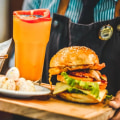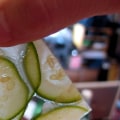Food science is an exciting field that offers a variety of professional opportunities. From developing new products to researching food safety and sustainability, a career in food science can be both rewarding and challenging. Let's take a look at two of the most popular careers in food science: Food Ingredient or Product Development Scientist and Food Microbiologist or Food Safety Expert. A Food Ingredient or Product Development Scientist is responsible for creating new products and improving existing ones. They work with a variety of ingredients to create new recipes and products that meet consumer needs.
They also develop quality control programs for food storage and processing operations, and improve the texture, flavor, color, chemical composition, convenience, and nutritional value of foods. A Food Microbiologist or Food Safety Expert is responsible for researching food safety and hygiene, as well as developing policies related to food safety. They analyze the levels of nutrients in foods by testing their content, and look for new sources of nutritional food. They also research ways to make processed foods taste good, safe, and healthy.
If you're interested in a career in food science, you can work in different sectors such as government, public, and private. In the government sector, you may be involved in research on safety and hygiene, food-related policies, and sustainability. In the public sector, you may work in research positions in institutions of higher education. In the private sector, you may be involved in developing new products and improving product packaging. In addition to these two popular careers in food science, there are other options available as well.
For example, if you're interested in working with animals and are concerned about animal health and safety, you might consider becoming an Animal Nutritionist. These professionals work in zoos, veterinary hospitals, and other facilities that house animals in need of care. They must understand the dietary needs of each animal and the types of food those animals eat in the wild. Another interesting field within the discipline of food science is that of Food Flavorings. Food scientists study the deterioration and processing of food through the use of microbiology, engineering, and chemistry.
They also determine the amount of calories each animal needs based on their age and size. Agricultural and Food Scientists work in a wide range of environments within the food science industry. You can work in laboratories, in the field, or in offices on behalf of universities, government agencies, or private companies. In general, agricultural and food scientists research on animals, crops, processing and packaging to contribute to the safety, quality, quantity, and convenience of foods. If you're interested in pursuing a career in food science, there are many educational options available. Some examples include food chemistry programs, sensory sciences programs, chemical engineering programs, food technology programs, and food safety programs. No matter which career path you choose within the field of food science, you can be sure that it will be both rewarding and challenging.
From researching new sources of nutritional foods to developing quality control programs for food storage and processing operations to creating new products for consumers to enjoy - there are many exciting opportunities available for those with a passion for food science.







Leave a Comment